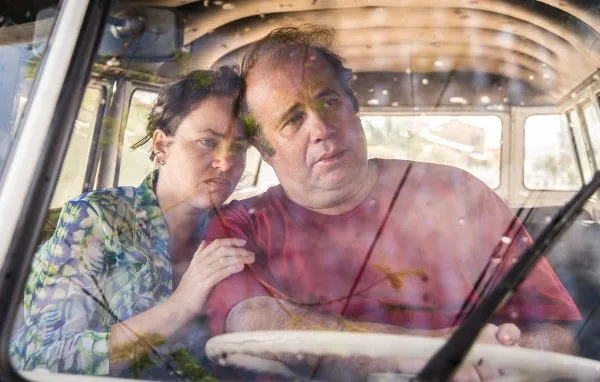Eye For Film >> Movies >> Loveling (2018) Film Review
Loveling
Reviewed by: Amber Wilkinson

It's a testimony to how often bad things happen to good people in films that when a warm-hearted one comes along it can take a good portion of the running time to believe it. But yes, Loveling is that rare beast of a family drama that puts the emphasis on pulling together rather than tearing apart.
That's not to say that the unnamed clan at the heart of Gustavo Pizzi's film have it easy. Their house is less than salubrious, with mum Irene (Karine Teles, who co-wrote the screenplay with then-husband Pizzi) having to take the kids out via the window in the film's first few minutes, while cheerfully ignoring cracks up the wall and grappling with the rebellious plumbing. Nevertheless, she and her dreamer husband Klaus (Otávio Müller) have built a happy home, with eldest son Fernando (Konstantinos Sarris), a handball ace, second son Rodrigo (Karine's nephew Luis Teles) handy with a tuba and her youngest twin boys (played by Teles and Pizzi's kids Artur and Francisco) a constant source of entertainment.

The plot is moved along by Fernando's selection for a German handball team, that leaves his family trying to put all the pieces of papers in place to a tight deadline - but the film is really driven by the ebb and flow of the family's emotions. Irene's are brought into sharp focus by the prospective departure of her son and the arrival of her sister Sônia (Adriana Esteves), who has fled her abusive addict husband Alan (César Troncoso) with their son Thiago (Vicente Demori). Irene also has her husband's desire to sell her beloved beach house and her own dream of finishing their half-built new house to contend with.
In short, the general run of things is the sort of organised chaos found in many sizeable households. Teles runs the gamut of emotions. We don't need to hear her discuss how she is feeling, we can see it written on her face - whether it is a 'dance like nobody is watching' moment as she chain-eats chocolate in the kitchen that is half a burning off of nervous energy, half a celebration of a moment alone, or the warring feelings of joy and sadness at the thought of Fernando's imminent trip.
She and Pizzi perfectly capture the way that there is no time for wallowing in this sort of family, as someone is always around to shift the mood. Water helps the feelings flow - from that recalcitrant tap, to heavy rain or the sea at the beach house, and cinematographer Pedro Faerstein delicately picks out blues in the background wherever possible. Pizzi has a strong grip of the movement of life in the household, economically pulling us towards the family and carefully controlling the rhythm of his scenes, whether he is lingering on the joys of a clandestine midnight feast between Rodrigo and Klaus, the fun of bathtime between Fernando and the twins or a peaceful moment of mother and son bonding that emerges out of the blue between Irene and her eldest. Scenes sometimes end at unusual points but this never feels forced and is just another indication of the way time moves in the household.
Humour is seamlessly woven in, from running gags such as the broken door that means the family have to enter and exit through the window, to Rodrigo's bulky tuba, with Pizzi letting these lighter moments join the general flow rather than thrusting them in our face. Despite this, we are also constantly reminded of the hard realities that the family are facing, particularly economically - but there's a sense that whatever lies on the horizon, they will tackle it together, and in the end, that's what matters most.
Reviewed on: 20 Jan 2018
















